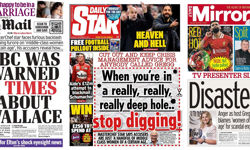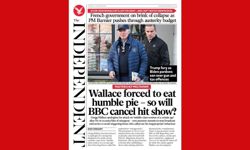In December 2014, The Times shocked its readers by crowning Nigel Farage, a man with a -17 voter approval rating, as its Briton of the year.
The Ukip leader had, it said, forced David Cameron to promise an EU referendum, forced Ed Miliband to pay more attention to heartland Labour voters who worried about immigration, and thereby done more than anyone to shape British politics.
Ukip had topped the poll in the May European elections and The Times said that it was “not impossible” that its MPs would hold the balance of power after the 2015 general election - although Scottish nationalists might elbow Farage from the limelight.
Which indeed they did. The SNP wiped out Labour in Scotland, Cameron returned to No 10 without the constraints of the coalition, Farage failed to win a seat and his party emerged with only one MP.
But Farage’s capacity to frame the political debate was undiminished. He had set the ball rolling.
That ball finally reached the skittles on 23 June, and when the wobbling number 10 pin toppled over, Farage got to mark an x for “strike” on his scorecard.
Ukip backers: the Express
Cheering the ball all the way down the lane was the Daily Express, whose owner, Richard Desmond, had given Ukip £1.3m to oil its path.
The paper had a long history of attacking the EU and fretting about immigration. It had been appalled by the prospect of Romania and Bulgaria joining the community – giving their citizens unfettered access to Britain – in January 2014, but Ukip’s electoral triumph led it to believe that victory in the crusade against Brussels was in sight. It was time to step up a gear.
More than a quarter of all Daily Express splashes between January 1 2014 and June 25 this year were concerned with migration or the EU, including two threats to “our kettles” and the suggestion that boys be taught to dust. All were negative and several had to be corrected after complaints to the Press regulator.
For the referendum, the daily diet of leaders, op-ed columns and letters was supplemented by posters for readers to stick in their windows and frequent “yes or no” online polls that came back with margins of which Putin or Mugabe would be proud – at least 95% could be relied upon to plump for the “correct” answer.
Farage, whose face was everywhere, was the star turn in an online debate in which he predicted that migrants’ bodies would be washed up on Kent beaches this summer. In the final week, there was a mini-series of spreads labelled “Why I’m voting Leave”. There was no sign of anyone considering voting Remain.
After their unswerving devotion to the cause, the Express and Farage might have felt entitled to claim the result as their own. But just as Ukip ended up as a sideshow to the official Leave campaign, so the Express was an adjunct to the real Press campaign. Farage is no Boris Johnson; Richard Desmond is no Rupert Murdoch or Paul Dacre.
Photoshop kings: the Sun
When the votes were counted, one industrial heartland voted Remain, and by a big margin: Liverpool. Could that have been because it is the one city where the Sun is notoriously unwelcome? And could that in turn mean that the Sun’s influence was pivotal elsewhere? The Guardian’s media editor, Jane Martinson, reports that within an hour of the result being declared, editor Tony Gallagher was texting, “So much for the waning power of the print media”. So he clearly thought so.
The Sun sees itself as a key political player and it plays the game cleverly. Once the reader has been snared by the promiscuous footballer and bikini girl on the front, he (it is usually he) is force-fed the meaty stuff inside. If it splashes on politics, the paper usually seeks a fun way to put the message across. It can also dumb down spectacularly: when Cameron was negotiating in Brussels, it led on a couple of aides having sex in the loo. A pair of rather good Dad’s Army fronts were balanced by the daft “scandal” that the Remain team were using Whatsapp messages to discuss tactics and outrage over plans for a soft porn film with Boris as Miley Cyrus on a wrecking ball. And then there was the notorious “Queen backs Brexit”.
Taking no prisoners: the Mail
The Sun may still – just – be the country’s best-selling paper, and the Liverpool anecdote may be testament to its influence, but if any paper could claim to have “won” this referendum, it would have to be the Mail.
When the Mail chooses to go to war, it has the most sophisticated arsenal and the best-trained, best-paid troops. It also has strategic capabilities way beyond most other forces in Fleet Street, so that it can both prepare a battle plan and react swiftly to events. If the Mail is on your side, you have every hope of success, but it makes for a terrifying enemy.
Dacre and Murdoch like to be power brokers and each uses his newspaper ruthlessly to get people where they want them. Dave and George were pals when the fight was against Red Ed, but both papers turned on them with venom when the battleground switched to Europe. For the Mail, Cameron was finished when he failed to negotiate a deal with Brussels that suited Mr Dacre.
Once the referendum date had been set and the Mail’s army was on the march, nothing and no-one, however authoritative, would be allowed to stand in the way of the Great Objective. In May last year, Mark Carney’s assertion that foreign workers may help to drive down wages made the Mail’s splash. A year later, the “governor of gloom” was slapped down for saying that a Brexit might lead to recession.
This was typical of the Mail’s approach. People who wanted to leave the EU were reported without contradiction. Those warning of the risks were derided as living on Planet Fear and had their words countered by a “fact” box to show that they didn’t know what they were talking about - or that they had no right to speak at all. As with the Express, the Mail deployed columnists, leaders and letter-writers to press the case. Max Hastings was allowed a couple of opportunities to say he was voting to stay in, but readers were left in no doubt where to put their cross.
The editors’ code – overseen by one P. Dacre Esq – does not require newspapers to be balanced in their reporting. But they are obliged to report with accuracy and to distinguish between fact, comment and conjecture. In this campaign, there was no balance and precious few facts – the entire economic argument was about guessing what might or might not happen, depending on how people in other countries regarded our decision.
Not the economy, stupid
The IMF, World Bank, George Osborne, the CBI and Bank of England were all “scaremongering” when they warned of the risks of recession, of the threat to inward investment, of falling sterling and stock markets. This was Project Fear. Yet all three pro-Brexit tabloids (the Desmond-owned Star also wanted Out but its coverage was negligible) were happy to stoke fears themselves. On polling day, the Sun carried a spread under the headline “Horrorscope” on the “dire forecast for the next ten years staying in the EU”. The Express and Mail both ran splashes saying that far from being at risk from a post-Brexit share price slump, pensions would be threatened if Britain did not leave. Meanwhile, the prize for ostrich economic reporting had to go to the Sun. On June 15, after opinion polls suggesting a Leave vote sparked four days of concerted selling that knocked £100bn off the value of FTSE 100 companies, its splash included the prediction that Brexit would give a “rocket boost” to shares. It didn’t mention that week’s losses.
Stoking immigration fears
For all three, though, the big issue was not the economy, but immigration.
In a poll based on crystal ball gazing, there was only one certainty: for as long as we remained in the EU, as it now stands, we would have no power to deny people from fellow member countries admission to our country.
For many voters, that was enough to want out. But it wasn’t enough for Leave campaigners or their supporters in the Press, which just had to distort and exaggerate, widening the agenda to encompass Turkey’s desire to join the EU and the possibility that its entire 79m population might want to come here. Economic migrants from Albania (not an EU member) buying dinghies on eBay to paddle to the UK, Syrian refugees trying to escape a country that had become a warzone largely thanks to Western intervention, and Somalis who had given up everything and risked their lives in overcrowded leaky boats - if you believed the pro-Leave papers, they all wanted to settle here. And, like the Leave campaign itself, the Press chose not to mention that an “Out” vote would not stop immigration from the EU. Or to acknowledge that an illegal immigrant would still be illegal whether we were in or out of the community.
These, then, were the papers and the arguments that won the day. The Telegraph, with star player Boris Johnson, was on the same side and was just as cavalier about immigration facts and fantasy, but in a sense it didn’t matter much.
Nor did the Guardian or the Times. They had some excellent and passionate writing for both sides, but how many people did they influence? A few thousand may have changed their minds in one direction, a few thousand more in the other, but - as Rupert Murdoch clearly recognised in tolerating The Times backing Remain - if any newspapers had any bearing on the result, it was the tabloids. And there’s one that hasn’t been mentioned yet.
AWOL: the Mirror
Vote Leave had the country’s most recognisable politician and its two best-selling papers; the Remain team had the pair of toffs responsible for years of austerity, a half-hearted Jeremy Corbyn and the Daily Mirror, a national newspaper with a local newspaper mentality. Suddenly, the result doesn’t look surprising.
The Express told its pensioners what to think and they voted accordingly, the Mail mustered its saloon bar battalions and office staff, the Sun its white van geezers. But what about the Mirror with its nurses and blue-collar workers?
The decision to leave the EU was made by ordinary people fed up with being shafted by the Establishment. For many, the vote was nothing to do with Europe and everything to do with telling Cameron and Osborne what they thought of them.
The Mirror had, of course, spent six years telling the Prime Minister and Chancellor what it thought of them – and that was the problem. Because now it found itself on the same team and it felt most uncomfortable.
The Mirror has always been on the side of the workers, wherever they come from – it is the only national paper not to have splashed on immigration this year – and as such was a popular newspaper that could have raised a different voice. But it stayed virtually silent.
If it didn’t want to turn off readers with EU splashes, it might at least have given the referendum some space inside. But for most of the campaign, it restricted itself to the odd piece on page 2, with only Kevin Maguire’s columns giving the coverage any welly. Its first spread appeared on June 6, and even that had an unconnected story about drug cartels in the Philippines.
The Mirror’s problem was that it couldn’t stop itself having a dig at the Tories at every opportunity. When George Osborne and Alastair Darling issued a joint warning that a £30bn emergency budget would be needed if Britain voted Out, it could have made a fuss of Darling, but instead it went into default mode with an “Osborne’s brutal Brexit budget” splash that could only have made readers think, “More Tory austerity”.
Newspapers were not obliged to campaign for either side – the i sat carefully on the fence throughout – and it was certainly not incumbent on the Mirror to counter Mail propaganda with similar fare from the opposite perspective. But it was its duty to be awake and alert.
The workers it is supposed to support and defend are the very people most worried about the influx of people from eastern Europe suppressing wages. The NHS, the Mirror’s most sacred cow, depends on tens of thousands of staff from overseas. Some message, any message, beyond “on the one hand, on the other…” needed to be sent to those readers.
Reporters needed to get off their backsides and out of London. They needed to spend less time worrying about Johnson, Gove, Cameron and Osborne and more time finding out from scientists, artists, planners, teachers how - for good or ill - EU membership affected their lives and their work. Their views were reported only in terms of “500 academics have written to the Guardian…” or in tired listy features headlined “What did the EU ever do for us?”
Ebbw Vale has had tens of millions of pounds of EU investment and it doesn’t have many immigrants, yet 62% of the votes cast there were for Leave. This is real Labour territory, the town once represented by Nye Bevan and Michael Foot. It’s where the Mirror should have been, but wasn’t.
It was also slow to react to stories that cropped up along the way.
In May, the Treasury Select Committee rebuked both sides for misleading voters and particularly criticised the “£350m a week for the NHS” slogan on Boris’s battlebus. That £350m claim was the big lie of the referendum. The Mail turned the story into an attack on George Osborne and most other papers gave the report scant treatment. If the Mirror had been committed, it would have come out with a front page headlined, “Stop lying to us”. Instead, it ran a four-par single on page 2, saying both sides had been told off.
John Major’s interview with Andrew Marr produced the best soundbite of the campaign: that the NHS was as safe in the hands of Gove and Iain Duncan Smith as a pet hamster with a hungry python. Major was rewarded with abuse from the Mail and Express and a straight report from the Mirror. There’s nothing wrong with straight reporting, much to recommend it. But just think what a pro-Remain Sun would have done with hamsters and pythons and photoshopped faces.
Comparing the polling day front pages tells you everything you need to know about the quality of the two redtops’ campaigns (shame about the block of text on the Sun). Every paper urged people to get out and vote, but the pro-Brexit Press was much better at saying what for and why – if not at telling the truth.
Picking the next PM
Murdoch and Dacre got the results they wanted: Britain may be on its way out of Europe and Cameron has gone. Now for a new Prime Minister. They’ve already started pulling the strings on that one, too. Boris Johnson is the country’s most popular politician and he served his purpose as the big beast of the campaign, but that’s as far as it goes.
On the Sunday after the referendum, the Sun splashed on a David Wooding story about a plot by “spiteful Tories” to launch a “vicious smear campaign” to stop Boris becoming Prime Minister.
But, of course, it wasn’t the Tories who stopped Boris. They didn’t get the opportunity. Wooding’s ultimate boss, a long-time Gove fan, had apparently already spoken.
During the Sky News referendum debate, Michael Gove told a member of the audience who asked about his leadership ambitions: “I am absolutely not standing.” But if Rupert calls… Dacre has meanwhile snubbed his columnist Sarah Vine (aka Mrs Gove) by endorsing Theresa May.
Some may think that we are in this situation, with both parties in turmoil and the country in limbo, because Cameron called an unnecessary referendum or because the Leave campaign and its newspaper supporters played dirty. Maybe. But the right-wing Press barons could have been thwarted if Labour had engaged in the campaign and the Mirror had remembered its Cudlippian heritage.
When John Major snatched a surprise victory in the 1992 general election, Kelvin McKenzie (now, apparently, a rueful Leaver) proclaimed, “It was the Sun wot won it.”
This time round, I am convinced it was the Mirror wot lost it.
Liz Gerard’s audit of referendum coverage can be found on the SubScribe website. It includes all the cuttings from the nine paid-for national papers for the final month of the campaign, plus blogs on the Mail’s strategy, the problems in policing the Press and on coverage of the Treasury Select Committee report.












